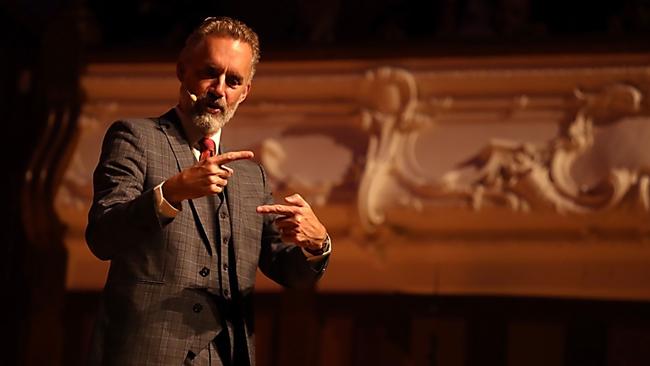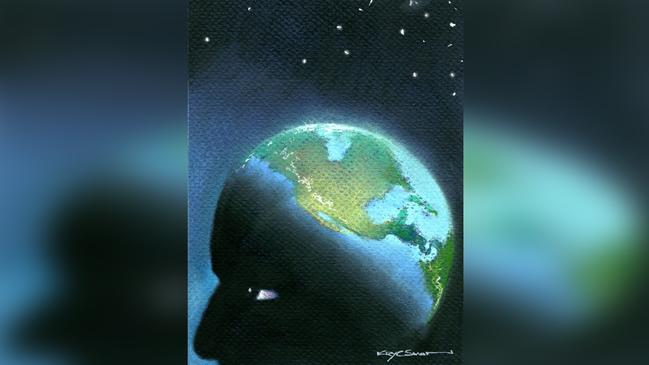Life’s never just about happiness – it’s about meaning

During this lecture tour for my book, 12 Rules for Life: An Antidote to Chaos, I have been to 126 cities and spoken to about 300,000 people. With each lecture, concentrating nominally on one or more of the rules, I try to formulate a problem so that I can articulate it clearly and address it in a manner that brings the audience along for the journey, and furthers my thinking about the topic.
In Christchurch, the topic was “Toxic Masculinity”, a phrase I particularly despise, one-sided and sexist as it clearly is. I talked about a friend of mine, a man who bought hook, line and sinker the idea that human action on the face of this troubled globe was destined to do nothing but increase the rate at which society disintegrated, individuals collapsed psychologically, and nature suffered under the adverse burden placed on it by the essential evils of humanity, men in particular. He had a very rough time of it, governed by that belief system, from the time he was a teenager until he committed suicide, due in large part to his ideologically inspired self-loathing, at the age of 40.
Each lecture is devoted, at least insofar as I can manage it, to a topic of equal seriousness and gravity. Despite this, audiences have been reduced mostly to absolute silence for the two hours or so of serious conversation, as we work to determine what continues to go wrong in this vale of tears that we inhabit, and how we might, if not endeavour jointly to improve ourselves, society and nature itself, at least diligently attempt to reduce the amount of unnecessary suffering, malevolence and, sometimes, outright hell that we are capable of producing.
Here is what is happening. YouTube and podcasts are revolutionary technologies. They bring long-form complex philosophical and psychological discussion to very large audiences who have the time and inclination to watch and listen, but who may not do the same with books. Perhaps five to 10 times as many people can and will listen and watch as would read. And people can usually find time (exercising, commuting, working around the home) to listen, which means they have time that once wasn’t usable in that manner to illuminate and enlighten themselves.
And there seems to be a vast and heretofore untapped market for precisely that desire. Both these new media forms, YouTube and podcasts, appear to produce very loyal audiences who are also, it seems, likely to want to see in person the people they have been watching and listening to.
And what happens in these personal lectures? I talk directly to the audience. No notes. No scaffolding. I tell them, as individuals, what problem we are here to address. It’s generally something of deep existential significance: the tyranny of society, the terror of nature, the ignorance and malevolence that too often characterise the individual and the family. We talk about the darkness of life, and of suffering, and of betrayal and nihilism and hopelessness and the desire for revenge. And then we extract some light out of the abysmal depths.
There is no discussion of happiness as the goal of life. Happiness, welcome as it is, is a side-effect, an unexpected benefit, a bit of the grace of God. If it comes your way, open your arms to it, embrace it and enjoy it. But it won’t last. What we all need instead of happiness is meaning — the kind of meaning that will sustain each of us through the suffering that life entails, so that we can endure the self-betrayal and the dissolution of our intimate relationships through death and distance and the illness and ageing and disappointment and death that await all of us, just and unjust alike.

And I tell my audiences something they all know but have not been able to fully understand or articulate: the sustaining meaning in life is to be found in the responsibility of life, the load we voluntarily decide to bear (and the heavier the better). We must take care of ourselves, as individuals, in a manner that makes us better for our families and sets the community right, such that the ship of state does not list too far right or left and sails for the destination that is true and proper. We must take stock of our multitudinous sins, appalling as they are (none of us is who we could be, and all of us do things we know we should not), attempt to atone for them, accept the adventure of our life, and try to encourage nature to shine her beneficial face upon us, keep the tyranny of our social organisations at bay, improve our characters as individuals and, most importantly, face the unknown with truth and courage so that we can discover what is new and necessary and eternally redemptive. It is in this manner that we co-operate in the creation of what has always been envisioned as the City of God, stumbling uphill towards it as we can.
And it is dead silence that descends on the audiences, all over the world, when I speak of such things, because they resound with the truth that tradition has bestowed on us and that our consciences remind us of in the painful manner that such reminders generally occur. It’s not political, and it’s not for young men (but for everyone). It’s the attempt to put the great stories of the Judeo-Christian tradition back firmly underneath our great culture, to provide it once again with some honour, gravitas and profundity — and some necessary burden.
It’s not like I’m lecturing from some great position of enlightenment. I am as ignorant, biased and malevolent in potential and spirit as the next (and even more than many) and am including myself in the vast population of people who need to hear such things once again and, more important, come to understand them consciously.
We have many difficult decisions confronting us, in the next decades, as our technological power continues to grow exponentially. I hope that wise people can make the proper decisions as to how that unforeseeable power might be used, and that what I am talking about, drawing on solid scientific data, clinical experience, and the wisdom of the past, might help in some small manner make a substantial number of us wiser in exactly that manner, so that we tilt the world towards the ever more heavenly place it might well become instead of degenerating into the hell we all know it could so easily be.
Jordan Peterson is a panellist on the ABC’s Q&A tonight.



